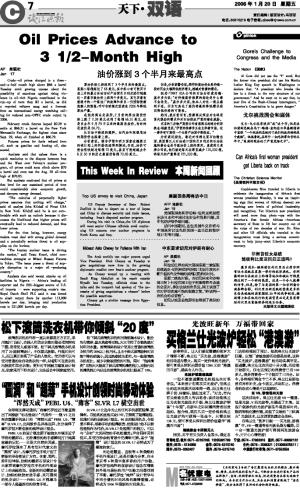AP 美联社
Jan 17
Crude-oil prices charged to a three-and-a-half month high above $66 a barrel Tuesday amid growing unease about the possibility of sanctions against rising violence in oil-rich Nigeria contributed to the run-up of more than $2 a barrel, as did a reported refinery snag and a forecast from an international energy watchdog calling for reduced non-OPEC crude output in 2006.
February crude futures leaped $2.39 to settle at $66.31 a barrel on the New York Mercantile Exchange, the highest close since Sept. 29, when oil finished at $66.79.
Futures prices for fuels refined from oil, such as gasoline and heating oil, also soared.
Analysts said that unless there is a quick resolution to the dispute between Iran and the West over Tehran's nuclear program, oil prices could soon climb above $70 a barrel and even test the Aug. 30 all-time high of $70.85.
But analysts cautioned that oil prices at that level for any sustained period of time could considerably slow economic growth, and dampen energy demand.
"The calculus of perpetually higher prices assumes that nothing will change," said oil analyst John Kilduff of Fimat USA in New York. Kilduff said he is not comfortable with such an outlook because it discounts the likelihood that higher prices will eventually lead to reduced demand, and thus lower prices.
For the time being, however, energy traders must deal with strong global demand and a potentially serious threat to oil supplies on the horizon.
"The Iranian nuclear issue is driving the market," said Tetsu Emori, chief commodities strategist at Mitsui Bussan Futures in Tokyo. "The issue poses a threat of supply disruption in a major oil-producing country."
Analysts also said recent attacks on oil facilities in Nigeria — Africa's leading oil exporter and the fifth-biggest source of U.S. oil imports — were supporting crude's rise. Royal Dutch Shell PLC said it was forced to slash output there by another 115,000 barrels per day, bringing total production cuts to 221,000 barrels per day.

